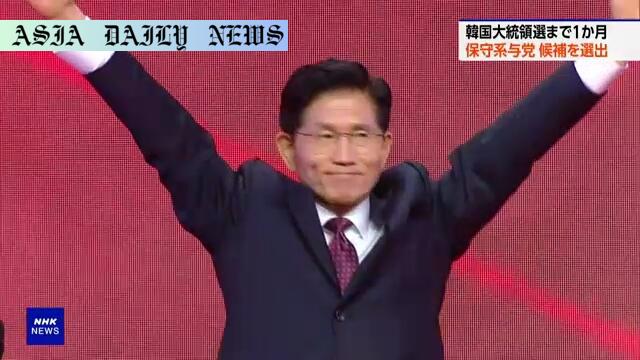Presidential Election: South Korea’s ruling People Power Party selects Kim Moon-soo as its candidate for the upcoming June 3 elections.

Introduction to South Korea’s Presidential Race
South Korea finds itself at a critical juncture as the nation prepares for its pivotal presidential election scheduled for June 3. The political landscape has been roiled by the impeachment of former President Yoon Suk-yeol, further intensifying the stakes for this upcoming event. In a defining moment at a party convention held near Seoul, the ruling People Power Party (PPP) has announced Kim Moon-soo as its candidate. A former governor of Gyeonggi Province and member of the National Assembly, Kim is recognized as a staunch conservative with a track record of opposing controversial policies. His nomination signifies a strong move to counter liberal forces, represented by Lee Jae-myung from the Democratic Party.
Kim Moon-soo’s Vision and Campaign Highlights
Kim Moon-soo’s campaign is centered around preserving South Korea’s democratic framework and combating what he perceives as overreach by liberal forces. A hardline conservative, Kim has openly criticized the opposition Democratic Party and its candidate, Lee Jae-myung, accusing them of endangering the nation’s future and liberal democracy. Kim’s speech at the convention emphasized the need for strong leadership to thwart dictatorial governance from the opposition. Furthermore, his call to unite forces underlines his willingness to collaborate, even suggesting a potential withdrawal in favor of a unified conservative candidate to amplify chances against Lee, a frontrunner in the polls.
Challenges in the Political Arena
South Korea’s political dynamics are complex, as evidenced by the entry of independent candidate and former Prime Minister Han Duck-soo into the race. Critics within the ruling party have urged the two conservative candidates, Kim Moon-soo and Han Duck-soo, to consider a coalition or concessions to avoid splitting votes. Additionally, public sentiment continues to lean towards opposition candidate Lee Jae-myung, who has consistently led in opinion polls. With Kim expressing a clear willingness to support a coalition, the ruling party is navigating a difficult path to consolidate its voter base and combat the dominance of the Democratic Party.
Public Perception and Poll Trends
The electoral landscape appears to be tilted in favor of Lee Jae-myung, who has garnered significant approval among the electorate. Despite Kim Moon-soo’s attempts to rally conservatives, the opposition’s narrative has resonated with many, particularly in light of Yoon Suk-yeol’s controversial impeachment and the allegations surrounding his administration’s actions. The rise of independent voices like Han Duck-soo adds another variable, potentially complicating any strategies for a unified conservative front. The public’s focus remains on the candidates’ abilities to address pressing national concerns such as economic recovery, labor reforms, and geopolitical stability in the region.
The Road Ahead
As the election date approaches, the intensity of the campaigns is expected to scale up. For Kim Moon-soo, the challenge lies not only in winning over undecided voters but also in consolidating a fragmented conservative faction. Meanwhile, Lee Jae-myung and the Democratic Party will aim to sustain their lead while addressing critiques from conservatives. The upcoming weeks will likely see heightened rhetoric, strategic alliances, and policy proposals as candidates vie for their place in South Korea’s democratic evolution.
Commentary
Deepening Polarization in South Korea’s Politics
The current presidential election in South Korea marks a significant moment in the nation’s democratic journey. The political divide between conservatives, led by Kim Moon-soo, and liberals, represented by Lee Jae-myung, is becoming increasingly evident. This polarization highlights the challenges of bridging ideological differences in a society grappling with economic uncertainties, labor demands, and regional pressures. While Kim’s conservative stance appeals to a segment yearning for traditional values, Lee’s progressive policies resonate with those seeking systemic change. Ultimately, this divide underscores the evolving nature of South Korean democracy.
The Role of Unity in Securing Leadership
One of the most intriguing aspects of this election is the potential for collaboration among conservatives. Kim Moon-soo’s willingness to team up with other factions demonstrates a pragmatic approach to achieving electoral success. However, the path to unity is fraught with challenges. Independent candidate Han Duck-soo’s entrance complicates matters, raising questions about whether personal ambitions or collective goals will prevail. For South Korea’s ruling party, uniting under a single banner is crucial to preventing vote splitting and increasing their chances against a formidable opponent like Lee Jae-myung.
Implications for South Korea’s Future
This election is more than just a contest of personalities—it is a defining moment for South Korea’s future. With pressing issues such as economic recovery, international relations, and social cohesion at stake, voters face a critical decision. The outcome will influence not only the country’s domestic policies but also its geopolitical standing. As the campaigns unfold, it is essential for citizens and leaders alike to focus on fostering a discourse that uplifts democratic principles, ensuring that South Korea continues to progress on its path of growth and stability.


